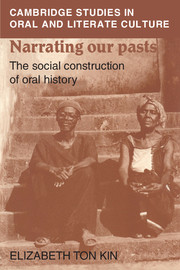Book contents
- Frontmatter
- Contents
- List of illustrations
- Acknowledgments
- Note on orthography
- Introduction
- 1 Jlao: an introductory case study
- 2 The teller of the tale: authors and their authorisations
- 3 Structuring an account: the work of genre
- 4 Temporality: narrators and their times
- 5 Subjective or objective? Debates on the nature of oral history
- 6 Memory makes us, we make memory
- 7 Truthfulness, history and identity
- Notes
- Bibliography
- General index
- Index of names
- Plate section
6 - Memory makes us, we make memory
Published online by Cambridge University Press: 05 June 2012
- Frontmatter
- Contents
- List of illustrations
- Acknowledgments
- Note on orthography
- Introduction
- 1 Jlao: an introductory case study
- 2 The teller of the tale: authors and their authorisations
- 3 Structuring an account: the work of genre
- 4 Temporality: narrators and their times
- 5 Subjective or objective? Debates on the nature of oral history
- 6 Memory makes us, we make memory
- 7 Truthfulness, history and identity
- Notes
- Bibliography
- General index
- Index of names
- Plate section
Summary
The status of the subject
So far, I have urged that oral narratives be seen as social actions, situated in particular times and places and directed by individual tellers to specific audiences. At the same time, they involve repetition and patterning. Genres evolve because successful tellings are imitated, and some performances become provinces of skilled personnel. Interactively, audiences and tellers develop conventions which cue ‘a horizon of expectation’; these conventions include performers’ delivery features, as well as presuppositions about appropriate time, occasion and purpose. The rules of grammar are further modulated through discourse, register and stylistic rules which limit and direct performers, but their creative work, even in and with the constraints of genre, can make it increasingly ‘artful’, aesthetically, emotionally and intellectually.
In the last chapter, I examined contentions that oral narrations encapsulate pieces of verbal repetition that can be treated as if they are objects, material ‘evidences in spite of themselves’. I argued that this perception derives from assumptions about text-as-product and a congruent social theory which are opposed by the approaches that I am supporting here. In this chapter, I extend my theoretical perspective to cognition and memory. I argue that memory and cognition are partly constituted by social relations and thus are also constitutive of society. We are all simultaneously bearers and makers of history, with discursive representations of pastness as one element in this generation and reproduction of social life.
- Type
- Chapter
- Information
- Narrating our PastsThe Social Construction of Oral History, pp. 97 - 112Publisher: Cambridge University PressPrint publication year: 1992
- 1
- Cited by



